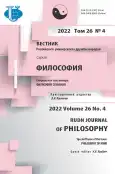Ethical Theoretical Reflections on Social Media: Place of the Human Being in the Digital Space
- Authors: Tsai W.1, Chistyakova O.V.2
-
Affiliations:
- National Chengchi University
- Peoples’ Friendship University of Russia (RUDN University)
- Issue: Vol 26, No 4 (2022): PHILOSOPHY OF MIND
- Pages: 870-881
- Section: INTERDISCISCIPLINARY STUDIES
- URL: https://journal-vniispk.ru/2313-2302/article/view/325300
- DOI: https://doi.org/10.22363/2313-2302-2022-26-4-870-881
- ID: 325300
Cite item
Full Text
Abstract
Raises the problem of ethics in interpersonal relations on the Internet. The ontological difference between digital cyberspace from the real world is emphasized and the corresponding conceptual constructions of modern thinkers are derived. Relevant questions of modern philosophy are substantiated - whether there are some specific ethical relations in cyberspace, which arise directly on the Internet, how they are possible, and how they can be regulated. As a theoretical and methodological basis for answering these questions, presents Levinas’ ideas regarding ethical thinking and the principles of “real” meetings on the Internet: for-the-other , face-to-face , and existent-beyond-Being . In this context, Levinas’ conception of interpersonal and ethical relations in digital reality and the role of the Other in these relations are examined. The idea of the Other as a subject being outside, but for whom the user of the Internet is responsible, is disclosed. This type of responsibility, according to Levinas, is an ethical norm. The article shows the phenomenon of augmented reality as a type of hybrid reality, which is formed with the help of digital technology. Augmented reality superimposes virtual images on the real world so that both parties interact with each other. It is emphasized that in modern social science augmented reality technology is seen as blurring the boundaries of virtual and real, as well as true and false. The concepts of Bill Persky, Nicholas Negroponte, and Marc Prensky on digital communication and the impact of cyberspace on humans are considered. Particular attention is paid to the analysis of the construction of so-called primordial ethical relationships on the Internet. An important place here is occupied by D. Barney’s theory, aimed at studying the impact of the technical characteristics of network technologies on the social interaction of people. His idea of building qualitatively new interpersonal relationships in the digital environment is emphasized. The characteristic of the virtual environment as a space without response and one-way communication is noted. In this regard, the concept of N. Luhmann about the construction employing mass media of a special illusory, symbolic space, which modern man perceives as objective reality, is substantiated. The problem of obtaining truth and objective knowledge-information is derived.
About the authors
Wei-Ding Tsai
National Chengchi University
Email: sprache@nccu.edu.tw
PhD in Philosophy, Associate Professor, Faculty of Philosophy No. 64, Sec. 2, Zhinan Rd., Taipei, 11605, Taiwan
Olga Vasil'evna Chistyakova
Peoples’ Friendship University of Russia (RUDN University)
Author for correspondence.
Email: chistyakova-ov@rudn.ru
ORCID iD: 0000-0002-1074-0913
Doctor of Sc. in Philosophy, Professor, Department of History of Philosophy
6 Miklukho-Maklaya St., Moscow, 117198, Russian FederationReferences
- Powers W. Hamlet’s Blackberry: Building a Good Life in the Digital Age. New York: Harper Collins Publishers; 2011.
- Negroponte N. Being Digital. New York: Vintage Books; 1996.
- Prensky M. Digital Natives, Digital Immigrants. On the Horizon. 2001;9(5):1-6.
- Serres M. Thumbelina: The Culture and Technology of Millennials. Transl. by Smith DW. London/New York: Rowman & Littlefield International; 2015.
- Barney D. The Network Society. Cambridge/Malden: Polity Press; 2004.
- Levinas E. Totality and Infinity. An Essay on Exteriority. Transl. by Lingis A. Pittsburgh: Duquesne University Press; 1969.
- Luhmann N. The Reality of the Mass Media. Moscow: Praksis; 2005.
- Lin S, Tsai WD, Chistyakov DI. Spiritual Exercise as Techne: Philosophy as a Way of Liberating Education. RUDN Journal of Philosophy. 2021;25(4):640-655. https://doi.org/10.22363/2313-2302-2021-25-4-640-655
- Chistyakov DI. Unilateral Exposure to Mass Media: Non-Сommunicative Person. RUDN Journal of Philosophy. 2020;24(3):467-479. (In Russian). https://doi.org/10.22363/2313-2302-2020-24-3-467-479
Supplementary files









